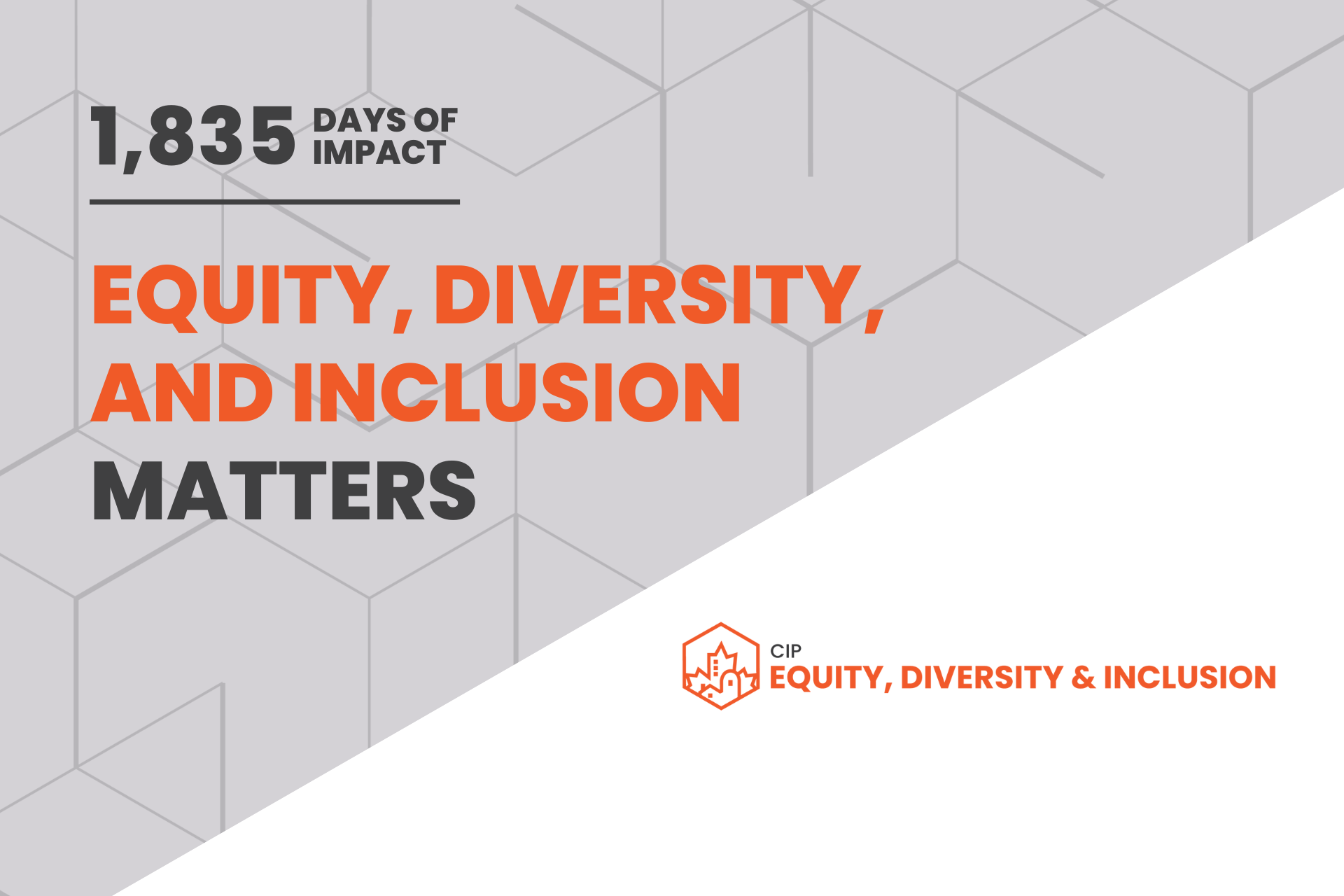Equity, Diversity, and Inclusion Matter to Planners.
Canada’s diversity continues to be one of its greatest strengths. As identified in CIP’s Strategic Plan—1,835 Days of Impact, we envision a future in which the planning profession helps to sustain inclusive and vibrant communities. To achieve that vision, we strive to promote the principles of equity, diversity, and inclusion both within and beyond the planning ecosystem.
The results of our Equity, Diversity & Inclusion Insight Survey have played a formative role in our strategy. The feedback from our membership has shown us that there remain critical gaps in the planning profession’s sense of diversity and inclusion.
We support a planning profession in Canada that is genuinely representative of the society in which it works, and recognize that our actions as an organization and a profession can leave a lasting impact across communities. Living by our values of Agile Wayfinders and Inclusive Mobilization, we continuously seek opportunities to build a brighter and more equitable future.


Agile Wayfinders
We constantly monitor our progress and path forward. We use intelligent wayfinding to stop, assess, and measure results so we can learn and improve. It’s not about perfection, it’s about progress.
Inclusive Mobilization
We welcome, listen to, and amplify diverse voices and efforts across Canada. By bringing people and partners together and leveraging strategic insights, we help ignite and fuel the fire for all.
CIP’s Contributions to Equity, Diversity, and Inclusion
CIP aspires to be a trusted voice for equity, diversity, and inclusion (EDI) for Canada’s planning community. While our actions on EDI span multiple levels, they can be broadly tied to three different groups:
- LEADERS: representing the diversity of our communities in the organization’s leadership
- MEMBERS: supporting inclusive workplaces and planning practices
- COMMUNITIES: advocating for social equity in planning for our diverse communities
Leaders: Representing the Diversity of Our Communities in the Institute’s Leadership

A key tool for guiding our work is CIP’s Equity, Diversity, and Inclusion Roadmap. Adopted in 2020, the Roadmap guides our action through four core areas: leadership commitment, education and communication, systemic changes, and sustainment. By focusing on the CIP Board and senior leadership, and encouraging collaboration with other industry leaders, this Roadmap has helped embed the principles of EDI into all of our organizational processes and reflect the perspectives and priorities of our membership.
As a proud signatory of the Government of Canada’s 50-30 Challenge, CIP embedded a commitment to achieve gender parity and significant representation of equity-deserving groups within our Board and senior leadership. Our participation in the Challenge ensures that we prioritize inclusivity throughout all strategic decision-making.
In 2023, CIP’s CEO Beth McMahon was invited to join the federal Technical Committee of the 50-30 Challenge, to help guide the metrics and measuring tool requirements necessary to certify compliant signatories. This committee offered the opportunity to take our EDI actions beyond the planning profession, helping to ensure that organizations from all fields can complete the Challenge.
Since 2019, all staff have been required to complete the Gender-Based Analysis Plus (GBA+) course offered by the federal government, and, in 2023, that commitment extended to the Board of Directors. The training helps to ensure that CIP’s policies, programs, and initiatives are considered through a lens that recognizes that women, men, and gender diverse people may experience them differently.
Members: Supporting Inclusive Workplace and Planning Practices

One aspect of our approach to promoting equity, diversity, and inclusion is the acknowledgment that planning students continue to advance the profession and that it is essential to create spaces and opportunities for them to succeed.
To put action to this commitment, we are proud to fund the CIP Diversity Impact Bursary, administered through the CIP/ICU Planning Student Trust Fund (CIP-PSTF), which supports Black students and students of colour in entering the planning profession. Its creation also inspired new funding for the Ages Foundation Diversity Impact Bursary, a five-year gift valued at $25,000. Through these investments, we strive to encourage diversity within the profession for generations to come.
Our commitment to EDI also guides the development of our national conferences. With the generous support of Urban Strategies Inc., we launched the Inclusion Fund, which offered 25 applicants from an equity-deserving group the opportunity to attend Navigation 2023 with no registration costs. We are pleased to offer the Inclusion Fund once again for our 2024 conference, CONNECTION. Additionally, we offer in-person and virtual conference attendance options, recognizing that a hybrid model honours principles of accessibility and community care. CIP has also taken measures to ensure greater diversity in conference programming, with the inclusion of cultural performances and other sessions at recent conferences (such as “From Africville to Beechville – Recasting Planning to foster Equity, Diversity, and Inclusion”) that are focused on the planning profession’s role in fostering an equitable future.
Most recently, the release of the 2023 Canadian Professional Planners National Employment Survey Report reflects our determination to support EDI across the planning ecosystem. Thanks to the participation of over 1,700 members, CIP and the Provincial and Territorial Institutes and Associations (PTIAs) now have updated data on representation and wage disparities within planning that will inform our future initiatives. Sharing this information with our members ensures that they are better equipped to grow in their careers.
Communities: Advocating for Social Equity in Planning for Our Diverse Communities

With the recognition that planners shape the communities they serve, and that planning practices have historically contributed to injustice against marginalized people, we aim to advocate for change and to promote safe and inclusive spaces for all.
Through our partnerships, CIP is involved in national and international conversations on creating and sustaining equitable communities. We recently provided feedback on Mobilizing Justice’s Accessibility Dashboard, which evaluates urban environments and provides a comparison of accessibility levels between their overall populations and different equity-deserving groups. In continued recognition of the Ontario Professional Planners Institute (OPPI)’s Anti-Black Racism in Planning Task Force and its 2021 report, CIP’s CEO participated in the 2023 (re)Gathering meeting to listen, learn, and to support Black planners and communities across Canada.
CIP also collaborates with the PTIAs to advocate for equity, diversity, and inclusion principles. In celebration of Black History Month in 2023, CIP and the PTIAs issued a joint statement and partnered with OPPI and the Black Planners and Urbanists Association on the webinar “Inhibited Growth: Examining Public Investment Gaps in Black Infrastructure Needs.”
Additionally, CIP observed International Women’s Day sharing testimonials from planners across the country. These initiatives reinforced the role of the planning profession in advancing equity for women and gender-diverse people. We also commemorated Pride Month by issuing a blog post that recognized the need for planners to create safe and inclusive spaces.
Reconciliation: Why Planners Are Essential on this Journey
Our actions to support equity, diversity, and inclusion involve the recognition that the planning profession is interconnected with the process of reconciliation. CIP is journeying to advance efforts toward reconciliation, envisioning a future in which reconciliation is meaningfully embedded in planning practices and where planners build respectful relationships with Indigenous peoples.
To learn more about how CIP has taken action toward reconciliation, please read Reconciliation: Why Planners are Essential on this Journey.
Continuing Our Commitments
Looking toward the future, CIP remains firmly dedicated to supporting equity, diversity, and inclusion initiatives both within and beyond the planning profession.
We are excited to partner with Jay Pitter Placemaking, York University’s Institute for Social Research, and other community foundations on the upcoming Being Black in Public Survey. The resulting data will benefit planners in their efforts to serve diverse communities from coast-to-coast-to-coast.
We are also partnering on several upcoming webinars that focus on the importance of advancing equity, diversity, and inclusion within the planning profession and the communities it serves. These include “Equity in Motion – Promising Practices for Advancing Sustainable Transportation Equity in Canadian Cities” with INTERACT on Wednesday, February 28, “Transportation Equity Dashboard” with Mobilizing Justice on Thursday, May 23, and “Urbanism Lab: The Inclusive Capital” with the National Capital Commission on Thursday, June 13.
In the coming weeks, we will be launching the 2024 edition of the EDI Insight Survey. This will allow us to continue to track our progress and identify the next steps in our ongoing work to bring about a more equitable, diverse, and inclusive profession and world. We encourage you to follow our social media channels to stay updated on this project.


